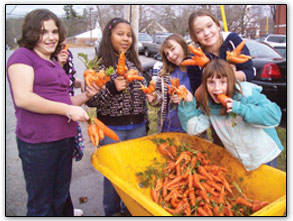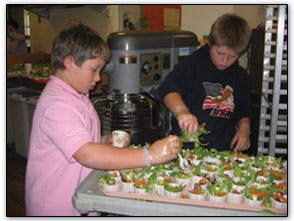Suggestions for Starting a School Composting and Gardening Program:
-Having Superintendent and Principal buy-in is very important. Starting with school leadership helps to bring the school community on board and ensures sustainability for your program.
-Include everyone in the school community, especially the kitchen and custodial staff with whom you’ll be working on a regular basis. And, of course, teachers.
-Try to involve the extended community as well as the school community as much as possible. This could include interested citizens, farmers, agricultural commission, environmental groups, Board of Health, Senior Citizens, garden club, Girl and Boy Scouts, local businesses and/or the local Business Association, etc. The extended community can provide financial and in-kind support, such as building skills, tilling and help in the garden.
-Involve students by giving a school assembly to describe the program. In lower grades, each class can study composting on a grade-appropriate level, then sign up as volunteers in the program. Make sure students are aware of the environmental impact of composting versus trashing organic materials such as food leftovers. Children of all ages want to make a difference in the world.
-Do a waste audit. Weigh your school’s cafeteria leftovers every day for a few weeks. Once you have a daily average, multiply it times 180 days to see how many lbs (or tons) of leftovers the school is generating. To determine the amount of bin space you will need to construct, you’ll need approximately 88 cubic feet of bin space per ton of leftovers to accommodate the leftovers and the dry materials to layer them with.
-A bin made of all new materials including rough cut pine lumber, hardware cloth for rodent-proofing and hardware can cost between $2.00 and $2.80 per cubic foot.
-Find a site that is, preferably, south-facing where bins can be located. Deciduous trees that provide shade help keep the pile moist in summer. In winter, the pile will benefit from more sun.
-If space is an issue, raised beds are more productive/sq.ft. Also, vermicomposting (composting in small bins with red wiggler worms) can be done in classrooms with no odor.

